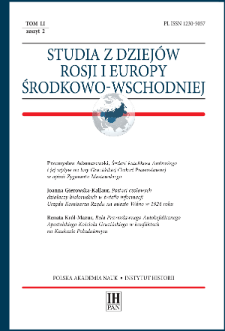- Search in all Repository
- Literature and maps
- Archeology
- Mills database
- Natural sciences
Advanced search
Advanced search
Advanced search
Advanced search
Advanced search

Object
Title: Polska polityka zagraniczna i rola wojska w geopolitycznych rozważaniach podpułkownika Tadeusza Zakrzewskiego, skierowanych do premiera, gen. Władysława Sikorskiego
Subtitle:
Studia z Dziejów Rosji i Europy Środkowo-Wschodniej T. 51 z. 2 (2016)
Contributor:
Institute of History of the Polish Academy of Sciences
Publisher:
Institute of History of the Polish Academy of Sciences
Place of publishing:
Description:
Summary in English and Russian. ; p. 151-175 ; Includes source appendix: Tadeusz Zakrzewski, Mój pogląd na politykę zagraniczną Polski i rolę wojska, p. 157-166
Type of object:
Abstract:
In January 1943 Lieutenant Colonel Tadeusz Zakrzewski (1897–1964) sent to the Supreme Leader and Prime Minister General Władysław Sikorski a memorandum on the objectives of Polish foreign policy. In his opinion, to win a war, it was necessary for the Polish government to play three Polish trumps against the governments of allied states, European allies of Germany and international public opinion. A role of the army was an armed combat at the side of the allies. Poland had to actively resist the Germans and fi ght all cooperation with them. Tasks of propaganda campaigns were both to disseminate the knowledge about Polish contribution to the fi ght against Germany, and also to present a vision of peace order. The result of the Polish foreign policy was to be a permanent reconstruction of Poland, restored within its pre-war boundaries, with some territorial gains in the west at the expense of Germany, and the creation of the Association of Central Europe.
References:
Bułhak H., Próba czechosłowackich kół wojskowych nawiązania rozmów sojuszniczych z polskim Sztabem Głównym w marcu 1938 r., „Studia z Dziejów ZSRR i Europy Środkowej” 15 (1979)
Dubicki T., Rostworowski S.J., Sanatorzy kontra Sikorszczycy, czyli walka o władzę na uchodźstwie w Rumunii 1939–1940, Warszawa 1993
Dubicki T., Wojsko Polskie w Rumuni w latach 1939–1941, Warszawa 1994
Dubicki T., Suchcitz A., Ofi cerowie wywiadu WP i PSZ w latach 1939–1945, t. 1, Warszawa 2009
Dymarski M., Stosunki wewnętrzne wśród polskiego wychodźstwa politycznego i wojskowego we Francji i Wielkiej Brytanii 1939–1945, Wrocław 1999
Historia dyplomacji polskiej, t. 4: 1918–1939, red. P. Łossowski, Warszawa 1995
Katelbach T., Akt pierwszy dramatu, „Zeszyty Historyczne” 7 (1965)
Kowalewski J., Cykl rumuński, „Zeszyty Historyczne” 6 (1964)
Pobóg-Malinowski W., Na rumuńskim rozdrożu (fragmenty wspomnień), cz. 3, „Kultura” 9–10 (1948)
Pobóg-Malinowski W., Najnowsza historia polityczna Polski (okres 1939–1945), t. 1, Gdańsk 1990
Poniński A., Wrzesień 1939 r. w Rumunii, „Zeszyty Historyczne” 6 (1964)
Relation:
Studia z Dziejów Rosji i Europy Środkowo-Wschodniej
Volume:
Issue:
Start page:
End page:
Detailed Resource Type:
Format:
Resource Identifier:
oai:rcin.org.pl:61781 ; p-ISSN 1230-5057 ; e-ISSN 2353-6403 ; 10.12775/SDR.2016.2.06
Source:
IH PAN, sygn. A.453/51/2 Podr. ; IH PAN, sygn. A.454/51/2 ; click here to follow the link
Language:
Language of abstract:
Rights:
Creative Commons Attribution BY-ND 4.0 license
Terms of use:
Copyright-protected material. [CC BY-ND 4.0] May be used within the scope specified in Creative Commons Attribution BY-ND 4.0 license, full text available at: ; -
Digitizing institution:
Institute of History of the Polish Academy of Sciences
Original in:
Library of the Institute of History PAS
Projects co-financed by:
Access:
Object collections:
- Digital Repository of Scientific Institutes > Partners' collections > Institute of History PAS > Serials
- Digital Repository of Scientific Institutes > Partners' collections > Institute of History PAS > Institute Publications
- Digital Repository of Scientific Institutes > Partners' collections > Institute of History PAS > Institute Publications > Journals
- Digital Repository of Scientific Institutes > Partners' collections > Institute of History PAS > Institute Publications > Journals > Studia z Dziejów Rosji i Europy Środkowo-Wschodniej
- Digital Repository of Scientific Institutes > Literature > Journals/Articles
Last modified:
Sep 22, 2023
In our library since:
Mar 1, 2017
Number of object content downloads / hits:
460
All available object's versions:
https://rcin.org.pl./publication/81446
Show description in RDF format:
Show description in RDFa format:
Show description in OAI-PMH format:
Objects Similar
Miszewski, Dariusz
Miszewski, Dariusz
Kersten, Krystyna (1931–2008)
Stępka, Stanisław
Szubtarska, Beata

 INSTYTUT ARCHEOLOGII I ETNOLOGII POLSKIEJ AKADEMII NAUK
INSTYTUT ARCHEOLOGII I ETNOLOGII POLSKIEJ AKADEMII NAUK
 INSTYTUT BADAŃ LITERACKICH POLSKIEJ AKADEMII NAUK
INSTYTUT BADAŃ LITERACKICH POLSKIEJ AKADEMII NAUK
 INSTYTUT BADAWCZY LEŚNICTWA
INSTYTUT BADAWCZY LEŚNICTWA
 INSTYTUT BIOLOGII DOŚWIADCZALNEJ IM. MARCELEGO NENCKIEGO POLSKIEJ AKADEMII NAUK
INSTYTUT BIOLOGII DOŚWIADCZALNEJ IM. MARCELEGO NENCKIEGO POLSKIEJ AKADEMII NAUK
 INSTYTUT BIOLOGII SSAKÓW POLSKIEJ AKADEMII NAUK
INSTYTUT BIOLOGII SSAKÓW POLSKIEJ AKADEMII NAUK
 INSTYTUT CHEMII FIZYCZNEJ PAN
INSTYTUT CHEMII FIZYCZNEJ PAN
 INSTYTUT CHEMII ORGANICZNEJ PAN
INSTYTUT CHEMII ORGANICZNEJ PAN
 INSTYTUT FILOZOFII I SOCJOLOGII PAN
INSTYTUT FILOZOFII I SOCJOLOGII PAN
 INSTYTUT GEOGRAFII I PRZESTRZENNEGO ZAGOSPODAROWANIA PAN
INSTYTUT GEOGRAFII I PRZESTRZENNEGO ZAGOSPODAROWANIA PAN
 INSTYTUT HISTORII im. TADEUSZA MANTEUFFLA POLSKIEJ AKADEMII NAUK
INSTYTUT HISTORII im. TADEUSZA MANTEUFFLA POLSKIEJ AKADEMII NAUK
 INSTYTUT JĘZYKA POLSKIEGO POLSKIEJ AKADEMII NAUK
INSTYTUT JĘZYKA POLSKIEGO POLSKIEJ AKADEMII NAUK
 INSTYTUT MATEMATYCZNY PAN
INSTYTUT MATEMATYCZNY PAN
 INSTYTUT MEDYCYNY DOŚWIADCZALNEJ I KLINICZNEJ IM.MIROSŁAWA MOSSAKOWSKIEGO POLSKIEJ AKADEMII NAUK
INSTYTUT MEDYCYNY DOŚWIADCZALNEJ I KLINICZNEJ IM.MIROSŁAWA MOSSAKOWSKIEGO POLSKIEJ AKADEMII NAUK
 INSTYTUT PODSTAWOWYCH PROBLEMÓW TECHNIKI PAN
INSTYTUT PODSTAWOWYCH PROBLEMÓW TECHNIKI PAN
 INSTYTUT SLAWISTYKI PAN
INSTYTUT SLAWISTYKI PAN
 SIEĆ BADAWCZA ŁUKASIEWICZ - INSTYTUT TECHNOLOGII MATERIAŁÓW ELEKTRONICZNYCH
SIEĆ BADAWCZA ŁUKASIEWICZ - INSTYTUT TECHNOLOGII MATERIAŁÓW ELEKTRONICZNYCH
 MUZEUM I INSTYTUT ZOOLOGII POLSKIEJ AKADEMII NAUK
MUZEUM I INSTYTUT ZOOLOGII POLSKIEJ AKADEMII NAUK
 INSTYTUT BADAŃ SYSTEMOWYCH PAN
INSTYTUT BADAŃ SYSTEMOWYCH PAN
 INSTYTUT BOTANIKI IM. WŁADYSŁAWA SZAFERA POLSKIEJ AKADEMII NAUK
INSTYTUT BOTANIKI IM. WŁADYSŁAWA SZAFERA POLSKIEJ AKADEMII NAUK




































